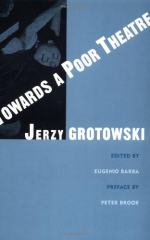
|
| Name: _________________________ | Period: ___________________ |
This quiz consists of 5 multiple choice and 5 short answer questions through Dr Faustus: Textual Montage.
Multiple Choice Questions
1. It is said in "Dr Faustus: Textual Montage" that if one wants sainthood, one must _____.
(a) Defy the Devil.
(b) Accept God.
(c) Be burned at the stake.
(d) Go against God.
2. In Scene 2 of "Dr. Faustus", who announces that his master is about to die?
(a) Minion.
(b) Wagner.
(c) Zygar.
(d) Firentgar.
3. What does Grotowski say that he and his actors are trying to avoid in "Towards a Poor Theatre" (Chapter 1)?
(a) Avant-garde.
(b) Eclecticism.
(c) Progress.
(d) Tradition.
4. When was the interview in "Towards a Poor Theatre" (Chapter 1) first published?
(a) 1962.
(b) 1966.
(c) 1960.
(d) 1965.
5. Grotowski claims in "Towards a Poor Theatre" (Chapter 1) that there is not a contradiction between inner technique and _____.
(a) Psychic ability.
(b) Artifice.
(c) Breathing.
(d) Physics.
Short Answer Questions
1. Who does Grotowski say asked the key methodological questions of acting in "Towards a Poor Theatre" (Chapter 1)?
2. To the average theatregoer, the theatre is first and foremost a what, according to Grotowski?
3. Whose work on "physical actions" is incorporated into Grotowski's system?
4. Who is the author of "Akropolis"?
5. In Scene 5 of Grotowski's "Dr. Faustus", Faustus talks to Cornelius and _____.
|
This section contains 183 words (approx. 1 page at 300 words per page) |

|




